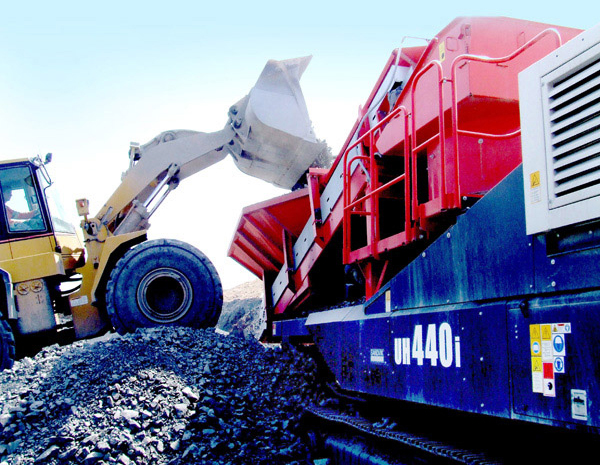
Investment in new mobile crushing equipment is helping one UK quarry to add flexibility to its production
Leaton quarry was first opened in Shropshire, UK in the 1920s and even after almost 90 years of operation, it is still a thriving business. The site, which is part of the Ennstone Group, extracts olivine dolerite, that has the right polished stone value characteristics for the local roads market. With around 7million tonnes of reserves still available within the 52ha planning permission area, Ennstone wanted to improve production capacity at the site to meet the growing call for its products from the company's asphalt plants. The company selected two 43tonne
Material is currently extracted over five 14m high benches by blasting, however the folded nature of the rock means that the blast design and frequency varies between twice a week and up to 10 days. The volume of rock extracted in each blast also varies - in particularly awkward locations Ennstone will only blast 1000tonnes, but on a main face it could be as much as 32,000tonnes. An average blast is around 20,000tonnes.
Leaton Quarry's main crushing plant uses a Svedala Superior crusher to reduce the blast material from 110mm down to 48mm, this feed going forward to two H200 hyrdrocone machines for further reduction. Oversize product is returned to an additional H200 hydrocone, to maximise the fine products. These have been in place since 1984 and 1988 respectively and have maintained an annual production of 350,000tonnes.
However, when Johnston Roadstone was acquired by Ennstone in 2004, an increased production target of 750,000 tonnes per year was set to meet the group's growing materials demands. "Having looked at the alternatives, we decided that mobile crushers were more suitable than a replacement static plant," said Ennstone Western region production manager Kieren McCabe. "A static plant would have cost several million pounds but the mobiles are just a fraction of that cost with the benefit of flexibility and reduced haulage costs." According to McCabe, the selection process was made easier by the company's long history of running the Svedala static plants. "The Svedala statics were extremely reliable so the thought of dealing with the company behind the Svedala brand gave us some additional confidence," he said. Now on site, the first of the UH440i crushers is loaded with 95mm material for onward feeding to a pair of screens; the other acts as a secondary crusher to a primary jaw to produce a range of 6, 10, 14, 20 and 32mm products.
The UH440i crushers are built around a Sandvik CH440 cone crusher that the company claims delivers the optimum combination of throughput and shape. "From the moment we saw the UH440i machines, we really liked the build quality," said McCabe. "The best feature is unquestionably the ease of operation - they have a huge programme choice and the ability to change product size with no loss of production while the crusher is in operation. The control system gives the operator a lot of options that allow us to maintain an excellent product shape, even at maximum productivity.
"The new units are producing four different products to a very high quality standard at a rate of approximately 270tonnes per hour. That compares extremely favourably with the static primary jaw crusher that was running at around 170tonnes per hour. Using one machine to achieve all this saves a lot of time and cost."













